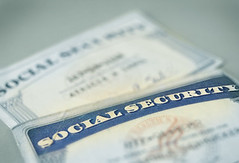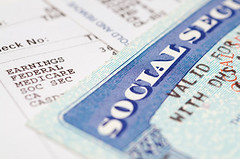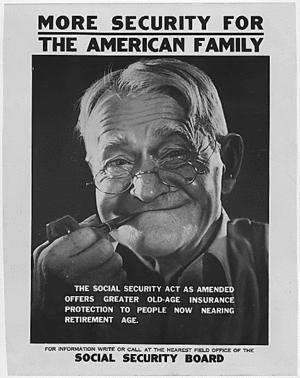The Social Security system is facing a 134 trillion dollar shortfall over the next 75 years. Meanwhile, nearly half of all American workers have less than $10,000 saved for retirement. The truth is that I was being incredibly kind when I said earlier that we are "woefully unprepared" for what is coming. The biggest retirement crisis in history is rapidly approaching, and a lot of the promises that were made to the Baby Boomers are going to get broken.
The following are 35 incredibly shocking statistics that will scare just about any Baby Boomer...
1. Right now, there are somewhere around 40 million senior citizens in the United States. By 2050 that number is projected to skyrocket to 89 million.
2. According to one recent poll, 25 percent of all Americans in the 46 to 64-year-old age bracket have no retirement savings at all.
3. 26 percent of all Americans in the 46 to 64-year-old age bracket have no personal savings whatsoever.
4. One survey that covered all American workers found that 46 percent of them have less than $10,000 saved for retirement.
5. According to a survey conducted by the Employee Benefit Research Institute, "60 percent of American workers said the total value of their savings and investments is less than $25,000".
6. A Pew Research survey found that half of all Baby Boomers say that their household financial situations have deteriorated over the past year.
7. 67 percent of all American workers believe that they "are a little or a lot behind schedule on saving for retirement".
8. Today, one out of every six elderly Americans lives below the federal poverty line.
9. More elderly Americans than ever are finding that they must continue working once they reach their retirement years. Between 1985 and 2010, the percentage of Americans in the 65 to 69-year-old age bracket that were still working increased from 18 percent to 32 percent.
10. Back in 1991, half of all American workers planned to retire before they reached the age of 65. Today, that number has declined to 23 percent. Read more >>
Showing posts with label Social Security. Show all posts
Showing posts with label Social Security. Show all posts
Monday, July 29, 2013
Monday, June 10, 2013
Federal budget cuts take a big bite out of unemployment checks
And in some states, recipients should brace for an upcoming shock. The places that took the longest to implement the cuts will need to compensate by slicing off a bigger chunk of recipients' remaining checks.
Federal unemployment insurance, which kicks in when state benefits run out, is one of the programs caught up in the forced budget cuts known as sequester. An estimated 3.8 million people will see their federal payments reduced this fiscal year, which ends in September. Federal benefits can last up to 47 weeks. State benefits, which last up to 26 weeks, are not affected.
The overall cut equals about 10.7% of each recipient's benefits this year, or an average of about $450 per person. Some states began trimming their payments right after sequestration began in March. For others, the hit is still looming. Read more >>
Monday, May 6, 2013
More Than 1 Million Baby Boomers Are Secretly Unemployed
How many Americans are forced into retirement because they couldn't find work? At the request of AOL Jobs, Matthew Rutledge, an economist at the Center for Retirement Research at Boston College, calculated that this group that remains invisible to the BLS. What he found: At the height of the recession, as many as 53,000 extra Americans were retiring early each month. In total, the recession has driven around 1.4 million additional Americans to collect Social Security early. Read more >>
Thursday, April 18, 2013
Singles retire with meager savings
If you think it’s hard saving for retirement as a couple, trying doing it as a single. According to a study—described by one expert as the most intriguing of 2012—the amount of money singles in their late 60s have saved up for retirement is dramatically less than that of married-couple households.
In fact, the median married household had in 2008 nearly 10 times more saved up for retirement than the median single-person household, $111,600 vs. $12,500. (Savings, for the record, included 401(k)s and IRAs and all taxable savings and investment accounts, but it did not include Social Security, pensions, or housing wealth. And single, at least for the purpose of this research could mean divorced, widowed or unmarried for most/all of their life.)
The difference was also extreme at the extremes, according to a blog post by Steve Utkus, who oversees the Vanguard Center for Retirement Research.
In his review of the study, Utkus noted that the top 30% of married households had savings of $332,400 or more while the top 30% of single-person households had just $90,000 or more. The bottom 30% of married households, meanwhile, had less than $24,000 saved while the bottom 30% of single-person households had less than $800. Read more >>
In fact, the median married household had in 2008 nearly 10 times more saved up for retirement than the median single-person household, $111,600 vs. $12,500. (Savings, for the record, included 401(k)s and IRAs and all taxable savings and investment accounts, but it did not include Social Security, pensions, or housing wealth. And single, at least for the purpose of this research could mean divorced, widowed or unmarried for most/all of their life.)
The difference was also extreme at the extremes, according to a blog post by Steve Utkus, who oversees the Vanguard Center for Retirement Research.
In his review of the study, Utkus noted that the top 30% of married households had savings of $332,400 or more while the top 30% of single-person households had just $90,000 or more. The bottom 30% of married households, meanwhile, had less than $24,000 saved while the bottom 30% of single-person households had less than $800. Read more >>
Labels:
Household,
Marriage,
Retirement,
Saving,
Single person,
Social Security,
United States,
Utkus
Tuesday, April 16, 2013
Social Security: Many pay more than they'll get back
Up until now, Social Security has been a windfall for many retirees: They collected far more in benefits than they shelled out in taxes. That's changing. Many of those retiring will have paid more into the coveted entitlement program than they will get back.
Here are the numbers:
A couple who each earned the average wage during their careers and retired in 1990 would have paid $316,000 in Social Security taxes, but collected $436,000 in benefits, according to data crunched by Eugene Steuerle, an economist at the Urban Institute.
Had that couple turned 65 in 2010, however, they would have paid $600,000 in taxes, but could expect to collect just $579,000. This is the first time in the program's history that taxes outweighed benefits for this group, a couple with average earnings.
The imbalance will get more pronounced for future generations of retirees. Couples now in their early 40s will have forked over $808,000 in Social Security taxes by the time they retire, but get back only $703,000 in benefits. Read more >>
Here are the numbers:
A couple who each earned the average wage during their careers and retired in 1990 would have paid $316,000 in Social Security taxes, but collected $436,000 in benefits, according to data crunched by Eugene Steuerle, an economist at the Urban Institute.
Had that couple turned 65 in 2010, however, they would have paid $600,000 in taxes, but could expect to collect just $579,000. This is the first time in the program's history that taxes outweighed benefits for this group, a couple with average earnings.
The imbalance will get more pronounced for future generations of retirees. Couples now in their early 40s will have forked over $808,000 in Social Security taxes by the time they retire, but get back only $703,000 in benefits. Read more >>
Tuesday, March 19, 2013
Retirement confidence at record low
Despite improving economic conditions, a record percentage of American workers remain worried that they won't be able to afford retirement.
They're worried about their jobs, high debt levels and rising living expenses, according to a survey released Tuesday by the Employee Benefit Research Institute.
Only 13% of workers surveyed said they "feel very confident" that they will be able to retire comfortably — less than half the percentage reported in 2007. Nearly half -- 49% -- said they were "not too" or "not at all" confident.
A large chunk of the workers surveyed have little or no retirement savings. Of those who provided estimates, 57% reported household savings and investments of less than $25,000, which included 28% of respondents who said they had less than $1,000. Only 24% reported savings of $100,000 or more.
Debt is standing in the way of saving. More than half of workers reported having a problem with their level of debt, while only about half of those surveyed said they could definitely cover $2,000 worth of unexpected expenses within the next month. Read more >>
They're worried about their jobs, high debt levels and rising living expenses, according to a survey released Tuesday by the Employee Benefit Research Institute.
Only 13% of workers surveyed said they "feel very confident" that they will be able to retire comfortably — less than half the percentage reported in 2007. Nearly half -- 49% -- said they were "not too" or "not at all" confident.
A large chunk of the workers surveyed have little or no retirement savings. Of those who provided estimates, 57% reported household savings and investments of less than $25,000, which included 28% of respondents who said they had less than $1,000. Only 24% reported savings of $100,000 or more.
Debt is standing in the way of saving. More than half of workers reported having a problem with their level of debt, while only about half of those surveyed said they could definitely cover $2,000 worth of unexpected expenses within the next month. Read more >>
Wednesday, January 30, 2013
Consumer confidence plunges to lowest level in more than a year
Consumer confidence plunged in January to its lowest level in more than a year, reflecting higher Social Security taxes that left Americans with less take-home pay.
The Conference Board said Tuesday that its consumer confidence index dropped to 58.6 in January. That's down from 66.7 in December and the lowest since November 2011.
Conference Board economist Lynn Franco said the tax increase was a key reason confidence tumbled and made Americans less optimistic about the next six months.
Congress and the White House reached a deal to prevent income taxes from rising on most Americans Jan. 1. But they allowed a temporary cut in Social Security taxes to expire. For a worker earning $50,000 a year, take-home pay will shrink this year by about $1,000. Read more >>
The Conference Board said Tuesday that its consumer confidence index dropped to 58.6 in January. That's down from 66.7 in December and the lowest since November 2011.
Conference Board economist Lynn Franco said the tax increase was a key reason confidence tumbled and made Americans less optimistic about the next six months.
Congress and the White House reached a deal to prevent income taxes from rising on most Americans Jan. 1. But they allowed a temporary cut in Social Security taxes to expire. For a worker earning $50,000 a year, take-home pay will shrink this year by about $1,000. Read more >>
Tuesday, January 29, 2013
Debt holds many Boomers back
With the average Baby Boomer a half-million dollars short on retirement savings, the prospects for actually retiring look slim. So what do we do about it?
Baby Boomers, forget about retirement. We'll be working for the rest of our lives. OK, that may be an exaggeration, but not by much.
We have not saved enough money. And worse, many of us will still be up to our eyeballs in debt when we do retire. We're just one medical emergency away from bankruptcy.
According to Boomers and Retirement, a new survey by TD Ameritrade, the average Baby Boomer is about a half-million dollars short on retirement savings.
And 74% of Boomers in the survey say they will have to rely heavily on Social Security in retirement. (The average Social Security check, by the way, is $1,230 a month.) Read more >>
Baby Boomers, forget about retirement. We'll be working for the rest of our lives. OK, that may be an exaggeration, but not by much.
We have not saved enough money. And worse, many of us will still be up to our eyeballs in debt when we do retire. We're just one medical emergency away from bankruptcy.
According to Boomers and Retirement, a new survey by TD Ameritrade, the average Baby Boomer is about a half-million dollars short on retirement savings.
And 74% of Boomers in the survey say they will have to rely heavily on Social Security in retirement. (The average Social Security check, by the way, is $1,230 a month.) Read more >>
Tuesday, January 15, 2013
Workers raiding retirement saving accounts to survive
A large and growing share of American workers are tapping their retirement savings accounts for non-retirement needs, raising broad questions about the effectiveness of one of the most important savings vehicles for old age.
More than one in four American workers with 401(k) and other retirement savings accounts use them to pay current expenses, new data show. The withdrawals, cash-outs and loans drain nearly a quarter of the $293 billion that workers and employers deposit into the accounts each year, undermining already shaky retirement security for millions of Americans.
With federal policymakers eyeing cuts to Social Security benefits and Medicare to rein in soaring federal deficits, and traditional pensions in a long decline, retirement savings experts say the drain from the accounts has dire implications for future retirees.
“We’re going from bad to worse,” said Diane Oakley, executive director of the National Institute on Retirement Security. “Already, fewer private-sector workers have access to stable pension plans. And the savings in individual retirement savings accounts like 401(k) plans — which already are severely underfunded — continue to leak out at a high rate.” Read more >>
More than one in four American workers with 401(k) and other retirement savings accounts use them to pay current expenses, new data show. The withdrawals, cash-outs and loans drain nearly a quarter of the $293 billion that workers and employers deposit into the accounts each year, undermining already shaky retirement security for millions of Americans.
With federal policymakers eyeing cuts to Social Security benefits and Medicare to rein in soaring federal deficits, and traditional pensions in a long decline, retirement savings experts say the drain from the accounts has dire implications for future retirees.
“We’re going from bad to worse,” said Diane Oakley, executive director of the National Institute on Retirement Security. “Already, fewer private-sector workers have access to stable pension plans. And the savings in individual retirement savings accounts like 401(k) plans — which already are severely underfunded — continue to leak out at a high rate.” Read more >>
Friday, January 4, 2013
Median net worth at lowest level since 1969 recent study finds
There may be a temporary jubilee with the notion that the fiscal cliff has been deferred for a few months. The media is quick to accept anything for a victory but very little has been done to stop our marching path onward on this massive debt spiral.
Many Americans continue to live in poverty with no visible exit. The latest figures show over 47 million Americans on food assistance. Many Americans as they enter their golden years are coming to fully rely on Social Security, a system that was on the table for being cut in the recent debates.
Since the Fed is creating asset bubbles and destroying fixed income investments, many older Americans are realizing that retirement is no longer a viable option given the rising costs in food, healthcare, and once again housing.
I see this on a monthly basis where you can spot older Americans in non-traditional and many times, temporary employment roles. None of this intervention is ending up in household income. In fact, when we examine real wealth the net worth of American’s is down to the lowest levels since 1969 when adjusting for inflation. Read more >>
Many Americans continue to live in poverty with no visible exit. The latest figures show over 47 million Americans on food assistance. Many Americans as they enter their golden years are coming to fully rely on Social Security, a system that was on the table for being cut in the recent debates.
Since the Fed is creating asset bubbles and destroying fixed income investments, many older Americans are realizing that retirement is no longer a viable option given the rising costs in food, healthcare, and once again housing.
I see this on a monthly basis where you can spot older Americans in non-traditional and many times, temporary employment roles. None of this intervention is ending up in household income. In fact, when we examine real wealth the net worth of American’s is down to the lowest levels since 1969 when adjusting for inflation. Read more >>
Thursday, December 27, 2012
Social Security Ran $47.8B Deficit in FY 2012; Disabled Workers Hit New Record
The Social Security program ran a $47.8 billion deficit in fiscal 2012 as the program brought in $725.429 billion in cash and paid $773.247 for benefits and overhead expenses, according to official data published by Social Security Administration.
The Social Security Administration also released new data revealing that the number of workers collecting disability benefits hit a record 8,827,795 in December--up from 8,805,353 in November.
The overall number of Social Security program beneficiaries—including retired workers, dependent family members and survivors and disabled workers and their dependent family members—also hit a record in December, climbing from 56,658,978 in November to 56,758,185 in December.
In 2011, according to the Bureau of Labor Statistics, there was an average of 112.556 million full-time workers in the United States, of whom 17.806 million worked full-time for local, state or federal government. That left an average of only 94.750 million full-time private sector workers in the country.
That means that for every 1.67 Americans who worked full-time in the private sector in 2011, there is now 1 person collecting benefits from the Social Security administration. Read more >>
Wednesday, December 26, 2012
Fiscal cliff negotiations reviving debate about screwing Retirees out of Social Security
Yes, we can fix Social Security (but it won't be pretty)
The fiscal cliff negotiations are reviving the debate about that other financial elephant in the room: Social Security. Under current government estimates, Social Security could face funding shortfalls in about two decades if nothing changes. That’s because the U.S. population is aging -- and generally living longer.
That sounds like a disheartening scenario for workers who are currently paying into Social Security and worry that they won’t get as much out of it once they retire. About half of the Americans polled by Pew Research Center earlier this year believe it’s not likely there will be enough money in Social Security and Medicare to maintain current benefit levels into the future.
But experts say there are ways to fix Social Security. Politicians just may not like trying to sell those changes to the American people.
It has happened before, though. In the mid-1980s, none other than President Ronald Reagan, working with Democrats in Congress, oversaw a major overhaul of the nation’s retirement safety net.
That’s something many say seems less likely these days.
“There are politicians – and especially in the Senate but also in the House as well – who could work together and come to an agreement,” said Alan Auerbach, a professor of law and economics at the University of California, Berkeley. “But they’re not the majority of Congress.” Read more >>
Thursday, December 20, 2012
Unemployment Benefits May Expire After Fiscal Cliff
After a 30-year career, managing housekeeping staff at a retirement community, Duckett was laid off last year. Despite looking for a job every day, she hasn't been able to find work. Duckett says if her unemployment benefits run out, she and her 14-year-old grandson, who lives with her, won't have enough money to eat.
"It's been a very difficult year," Duckett said. "The check keeps a roof over our head. ... I can't even imagine what we're going to do without that check."
She is among 2.1 million Americans who will no longer be able to apply for unemployment benefits in the New Year. Another 1 million people who don't have jobs will also exhaust their state benefits in early 2013 and lose their benefits, according to the National Employment Law Project, an advocacy group. Read more >>
Wednesday, November 7, 2012
How liberals will eventually throw Social Security and Medicare under the bus
STEP ONE: Liberals will declare that cutting Social Security and Medicare benefits - including raising the eligibility age or introducing "means-testing" - are absolutely unacceptable, that they will never support any bill that does so no matter what other provisions it contains, that they will wage war on Democrats if they try.
STEP TWO: As the deal gets negotiated and takes shape, progressive pundits in Washington, with Obama officials persuasively whispering in their ear, will begin to argue that the proposed cuts are really not that bad, that they are modest and acceptable, that they are even necessary to save the programs from greater cuts or even dismantlement.
STEP THREE: Many progressives - ones who are not persuaded that these cuts are less than draconian or defensible on the merits - will nonetheless begin to view them with resignation and acquiescence on pragmatic grounds. Obama has no real choice, they will insist, because he must reach a deal with the crazy, evil GOP to save the economy from crippling harm, and the only way he can do so is by agreeing to entitlement cuts. It is a pragmatic necessity, they will insist, and anyone who refuses to support it is being a purist, unreasonably blind to political realities, recklessly willing to blow up Obama's second term before it even begins.
STEP FOUR: The few liberal holdouts, who continue to vehemently oppose any bill that cuts Social Security and Medicare, will be isolated and marginalized, excluded from the key meetings where these matters are being negotiated, confined to a few MSNBC appearances where they explain their inconsequential opposition.
STEP FIVE: Once a deal is announced, and everyone from Obama to Harry Reid and the DNC are behind it, any progressives still vocally angry about it and insisting on its defeat will be castigated as ideologues and purists, compared to the Tea Party for their refusal to compromise, and scorned (by compliant progressives) as fringe Far Left malcontents.
STEP SIX: Once the deal is enacted with bipartisan support and Obama signs it in a ceremony, standing in front of his new Treasury Secretary, the supreme corporatist Erskine Bowles, where he touts the virtues of bipartisanship and making "tough choices", any progressives still complaining will be told that it is time to move on. Any who do not will be constantly reminded that there is an Extremely Important Election coming - the 2014 midterm - where it will be Absolutely Vital that Democrats hold onto the Senate and that they take over the House. Any progressive, still infuriated by cuts to Social Security and Medicare, who still refuses to get meekly in line behind the Party will be told that they are jeopardizing the Party's chances for winning that Vital Election and - as a result of their opposition - are helping Mitch McConnell take over control of the Senate and John Boehner retain control of the House.
With last night's results, one can choose to see things two ways:
(1) emboldened by their success and the obvious movement of the electorate in their direction, liberals will resolve that this time things will be different, that their willingness to be Good Partisan Soldiers depends upon their core values not being ignored and stomped on, or
(2) inebriated with love and gratitude for Obama for having vanquished the evil Republican villains, they will follow their beloved superhero wherever he goes with even more loyalty than before. One does not need to be Nate Silver to be able to use the available historical data to see which of those two courses is the far more likely one. Read more >>
Wednesday, October 31, 2012
Real Economy Still Sliding As Eating Out Continues Decline
As Bloomberg Briefs notes, spending on dining out has fallen from 4.5% growth at the beginning of the year to under 1.8% growth currently (the lowest since May 2010). Add to this the slowdown in jewelry spending and the drag on discretionary spending likely from Sandy and we suspect the modicum of estimate revisions that have started to be published by sell-side analysts will need a little more adjustment.
Real Consumer Spending remains stagnant. Read more >>
Wednesday, October 17, 2012
Seniors on Social Security squeezed by rising prices
To keep pace with the rising cost of living, the Social Security Administration announced a 1.7% benefits increase for 2013. This will give a $19 boost to the average benefit of $1,130 a month. For some of the 56.3 million people who get Social Security -- either because they are retired or disabled -- the increase may not be enough to keep up with rising expenses.
"We're grateful for any small increase [in Social Security benefits], but believe me, any small increase doesn't begin to cover the major increases we're seeing in things like vegetables, fruits, bread and milk," said Mason.
Part of the problem is a disconnect between the official inflation figure and what seniors actually pay, experts and seniors say. The inflation number used to calculate the cost of living adjustment is based on spending patterns among workers of all ages and across hundreds of items. A more accurate calculation would put more weight on the items that seniors purchase most frequently -- like food, gas and medical care, according to the American Institute for Economic Research. Read more >>
Advil Ibuprofen Tablet Packets - 50 pks. of 2 ct. - Pain Relief (Google Affiliate Ad)
Thursday, September 20, 2012
Next School Crisis for Chicago: Pension Fund Is Running Dry
One of the most vexing problems for Chicago and its teachers went virtually unmentioned during the strike: The pension fund is about to hit a wall. The Chicago Teachers’ Pension Fund has about $10 billion in assets, but is paying out more than $1 billion in benefits a year — much more than it has been taking in. That has forced it to sell investments, worth hundreds of millions of dollars a year, to pay retired teachers. Experts say the fund could collapse within a few years unless something is done.
“There’s a huge crisis,” said Laurence Msall, president of the Civic Federation, a nonpartisan research organization in Chicago that works on fiscal issues. “The problem does not get easier by waiting. The problem gets bigger, and starts to become an insurmountable obstacle.”
Teachers in Chicago, as in many cities, do not earn Social Security credit for their years in the classroom. Read more >>
Wednesday, September 19, 2012
The FED Is Systematically Destroying Social Security And The Retirement Plans Of Millions
Last week the mainstream media hailed QE3 as the "quick fix" that the U.S. economy desperately needs, but the truth is that the policies that the Federal Reserve is pursuing are going to be absolutely devastating for our senior citizens. By keeping interest rates at exceptionally low levels, the Federal Reserve is absolutely crushing savers and is systematically destroying Social Security.
Meanwhile, the inflation that QE3 will cause is going to be absolutely crippling for the millions upon millions of retired Americans that are on a fixed income. Sadly, most elderly Americans have no idea what the Federal Reserve is doing to their financial futures. Most Americans that are approaching retirement age have not adequately saved for retirement, and the Social Security system that they are depending on is going to completely and totally collapse in the coming years.
Right now, approximately 56 million Americans are collecting Social Security benefits. By 2035, that number is projected to grow to a whopping 91 million. By law, the Social Security trust fund must be invested in U.S. government securities. But thanks to the low interest rate policies of the Federal Reserve, the average interest rate on those securities just keeps dropping and dropping. Read more >>
Wednesday, August 29, 2012
Half of Americans Die With Almost No Money
Almost half of U.S. retirees die with savings of $10,000 or less, but that grim finding doesn’t fully describe the variability and uncertainty that characterize retirement in America, according to a recent study. While some retirees struggle profoundly, living at or below the poverty line, others enjoy wealth and health—in fact, the two are strongly linked—while still others have little in savings but enjoy a decent income, according to the report, based on a survey that tracked retirees from 1993 through 2008.
While 46% of retirees have just $10,000 in savings when they die, “That doesn’t mean their standard of living is very low—they might have a relatively generous pension plan, most of them will have Social Security,” said James Poterba, professor of economics at M.I.T., president of the National Bureau of Economic Research, and a co-author of the study.
But the findings “suggest something about the financial resiliency of these households,” Poterba added. “They may not have much capacity to absorb a shock, such as an out-of-pocket medical expenditure. They don’t have very much in the way of liquid assets they can access.” Read more >>
While 46% of retirees have just $10,000 in savings when they die, “That doesn’t mean their standard of living is very low—they might have a relatively generous pension plan, most of them will have Social Security,” said James Poterba, professor of economics at M.I.T., president of the National Bureau of Economic Research, and a co-author of the study.
But the findings “suggest something about the financial resiliency of these households,” Poterba added. “They may not have much capacity to absorb a shock, such as an out-of-pocket medical expenditure. They don’t have very much in the way of liquid assets they can access.” Read more >>
Wednesday, August 22, 2012
More Than Half Of All Americans Are At Least Partially Dependent On The Government
A very large segment of the population has figured out that it can use voting as a tool to get more money and benefits from the government, and that is a very dangerous thing. Once upon a time, the free market was the one that distributed nearly all the wealth in our system.
But now the federal government has become a giant deluded "Santa Claus" that distributes goodies to the American people far beyond its actual capacity to do so. In fact, we are borrowing trillions of dollars that we do not have so that our politicians can continue to buy votes with handouts. Look, we will always need a safety net. We don't want anyone in America starving to death or sleeping in the street.
However, our current system has gotten completely and totally out of control. Today, there are nearly 80 different "means-tested welfare programs" operated by the federal government. As I have written about previously, more than 100 million Americans are enrolled in those programs. Sadly, that does not even count Social Security and Medicare. Tens of millions of Americans are enrolled in each of those programs as well. Read more >>
But now the federal government has become a giant deluded "Santa Claus" that distributes goodies to the American people far beyond its actual capacity to do so. In fact, we are borrowing trillions of dollars that we do not have so that our politicians can continue to buy votes with handouts. Look, we will always need a safety net. We don't want anyone in America starving to death or sleeping in the street.
However, our current system has gotten completely and totally out of control. Today, there are nearly 80 different "means-tested welfare programs" operated by the federal government. As I have written about previously, more than 100 million Americans are enrolled in those programs. Sadly, that does not even count Social Security and Medicare. Tens of millions of Americans are enrolled in each of those programs as well. Read more >>
Subscribe to:
Posts (Atom)
























